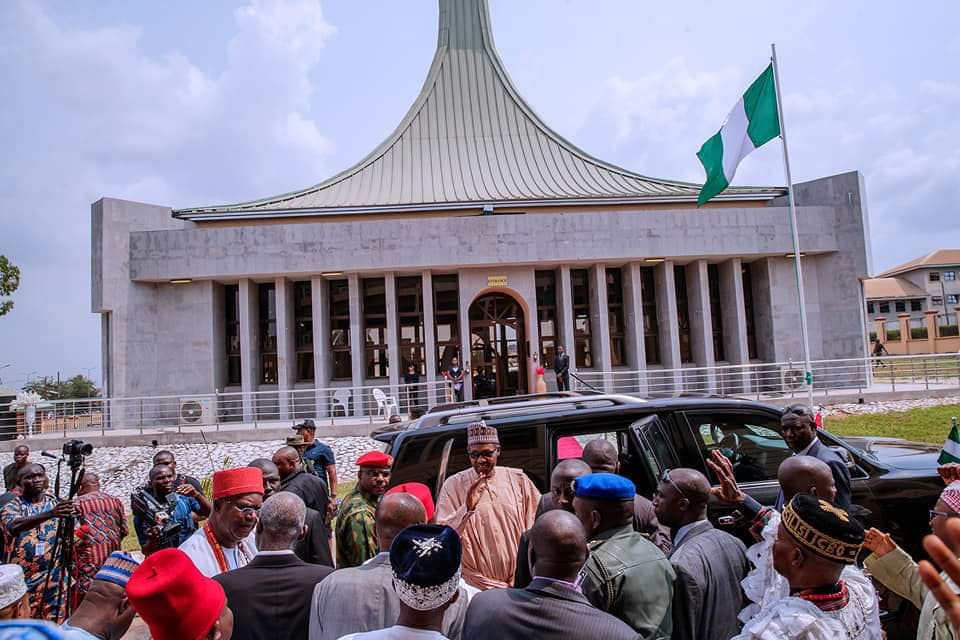WRITTEN BY OBIORA NEZIEANYA
Two governments in Nigeria recently took different but related steps to immortalize Nigeria’s founding president, Dr Nnamdi Azikiwe. The Anambra State government announced that November 16, Dr Azikiwe’s birthday, would henceforth be a work-free day in the state, asking the national government to make it a national holiday. The Federal Government, on the other hand, commissioned on Friday, January 25, 2019, the Zik Mausoleum, which was started 23 years ago by the Sani Abacha military regime.
Since the two events honouring The Great Zik of Africa, some Nigerians, especially the younger ones, have been trying to find out Zik’s place under the Nigerian—nay, African– firmament. It is usual for people to attempt to explain Zik’s place in our history by referring to the positions he occupied in his days.
He was Nigeria’s first indigenous Governor-General, first Senate President and the first President of the Republic. He is, of course, the only Nigerian to have his name in the country’s Constitution. The 1963 Constitution, which made Nigeria a republic, stated that Nigeria’s president “shall be Dr Nnamdi Azikiwe”.
However, Zik’s place in Nigeria’s cosmology goes far beyond the positions he held. He gave nationalism and the independence struggle a new meaning. Zik saw himself as a pan Africanist. Born of Igbo parentage in Zungeru, in today’s Niger State, he grew up in Calabar and Lagos, studied in the United States, settled in Ghana on his return from overseas and wrote a book entitled “Liberia in World Politics”. He spoke the three main Nigerian languages fluently.
Zik formed the National Council of Nigeria and Cameroun (NCNC) and made it a national movement, the first in Nigeria’s history. The result was that Nigeria’s independence came earlier than the colonial masters had envisaged. Zik changed the face of Nigerian journalism even more than he altered the nationalist struggle. He established newspapers in Lagos, Ibadan, Kano, Zaria, Port Harcourt and Onitsha. Many people wanted to be like him. Chief Obafemi Awolowo had to travel to London to study law as an adult in order to acquire knowledge and oratorical skills comparable to Zik’s. Chief Awolowo even established Tribune newspaper on Zik’s birthday as a tribute to Zik.
Zik’s Igbo people perhaps benefitted more from Zik. To solve the problem of a lack of university graduates in Igboland in comparison to the Yoruba, he took nine bright and ambitious young Igbo boys to the United States to study. They included Dr K. O. Mbadiwe, Dr Okwunodu Okongwu, Dr Abyssinia Nwafor Orizu, Mazi Mbonu Ojike, Professor Chukwuemeka, Prof JBC Okala and Dr Okechuchukwu Ikejiani. On return to Nigeria, they joined in the struggle for independence, and made a huge impact.
As premier of the Eastern Region in the fifties, Zik built the famous Nigeria Cement Company at Nkalagu in today’s Ebonyi State. He built Nigergas and Nigersteel, Nigeria’s first steel companies. He built the Eastern Nigerian Development Corporation which played a critical role in the building of the University of Nigeria at Nsukka, the country’s first indigenous university
This feat challenged the Western Nigerian government under Chief Samuel Akintola to build the University of Ife at Ile Ife. It also challenged the Northern Region under Sir Ahmadu Bello to set up Ahmadu Bello University at Zaria. The Federal Government built its own University of Lagos at Akoka in 1962.
It is interesting that the Eastern Nigerian government was then the poorest in the country because its main revenue earner, palm produce, was not commanding high prices on the international market. The richest was the Western Region because cocoa, its major revenue source, was attracting high prices. The second wealthiest region was the North because groundnut, its primary revenue earner, was getting good prices.
Not to be forgotten is that Zik established in the fifties Nigeria’s first indigenous bank, African Continental Bank (ACB). The ACB emergence caused the Western Nigerian government to set up the National Bank of Nigeria and the Northern government to establish the Bank of the North. ACB played a critical part in the rise of the former Biafrans at the cessation of hostilities in 1970. It was granting credit facilities on far more liberal terms than other banks because it knew the erstwhile Biafrans could not afford much collateral. Zik equally played prominent role to the end of the civil war.
Because Ndigbo were still afflicted psychologically by the outcome of the Civil war by 1978 when the ban on politics was lifted, there were no serious presidential candidates of Igbo origin. Zik felt bad and so decided to participate in the presidential race after resisting the urge to return to politics.
Founders of Ohaneze Ndigbo like Dr Pius Okigbo were thoughtful enough to recognise Zik’s unparalleled role in the emergence of Ndigbo in modern history. They made him the only Patron of Ohaneze Ndigbo socio-cultural organization.
It is, therefore, sacrilegious that the current Ohaneze officers chose to hold a meeting of its inner caucus on Friday, January 25, 2019, the very day the Nigerian nation was honouring The Great Zik of Africa by commissioning the Zik Mausoleum in Onitsha, Anambra State.
The so-called Ime Obi meeting of Ohaneze was meant to disrupt the ceremony and discredit Zik’s place in history. As a commentator has noted, Chief Nnia John Nwodo, whose father was a minister under Zik in the fifties and his cohorts decided to dance on Zik’s grave. This is an abomination of the highest order and they must cleanse the land.









Comments are closed for this post.